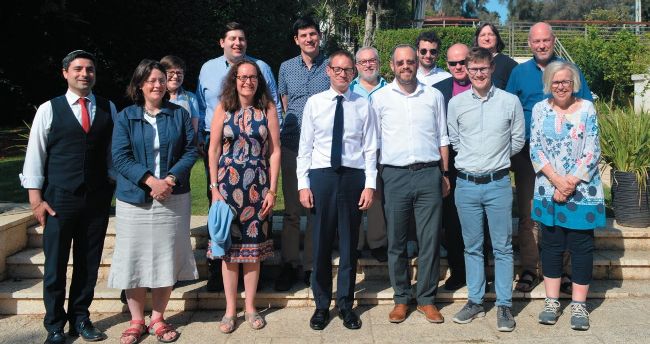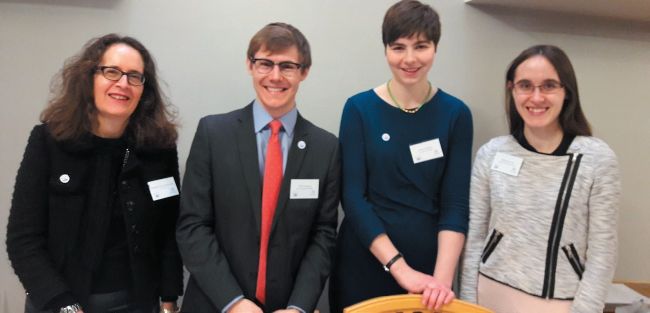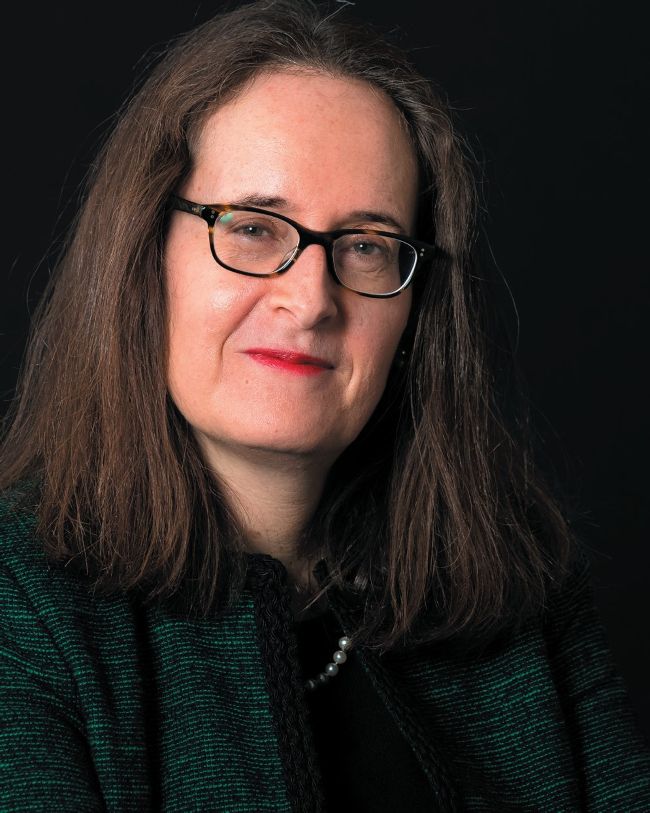Building strong communities
Thomas Baldwin meets Elizabeth Harris-Sawczenko and learns about the work of the Council for Christians and Jews.
“UNFORTUNATELY we are in a period of history with a lot of division, and it’s more important than ever to support one another.” Elizabeth Harris-Sawczenko, director of the Council for Christians and Jews (CCJ), has, among other reasons, a family history of fighting religious intolerance and supporting refugees.
Elizabeth’s great uncle was the Rev Dr Isaac Levy, Senior Jewish Chaplain in the British Army during World War Two, who witnessed the horrors of Bergen-Belsen after its liberation. After the war he spent decades advocating for interfaith cooperation, and was heavily involved with the CCJ.
“I grew up as a young child going to his house and listening to his stories and meeting Christian clergy,” says Elizabeth. “He had this real commitment to building relationships and to interfaith engagement that was very inspiring.”
Elizabeth spent 23 years working in Jerusalem, including as director of a social justice organisation. On returning to the UK in 2007, she served the Jewish community, before moving to the CCJ five years ago. Elizabeth was the CCJ’s first Jewish deputy director, then with director Jane Clements. It was the first time there had been a Christian-Jewish partnership at the director level. She is now the first Jewish Director of CCJ.
“It was a time when we had a lot of opportunities to make some important changes in the organisation,” she says. “We really wanted to create a forum with as many diff erent Christian and Jewish voices as possible, to bring more diversity and nuance to the work of CCJ.”
CCJ was founded in 1942 by Chief Rabbi Joseph H Hertz and Archbishop of Canterbury William Temple, in the face of rising antisemitism at home and growing awareness of the atrocities being inflicted on the Jewish communities in Europe. When it celebrated its 75th anniversary in 2017, it took the theme of ‘How Good it is to Dwell Together’, based on Psalm 133.
The organisation takes as its model the open tent: a place for people to meet, learn about and from each other.
In practice it groups its activities under three headings – education, dialogue and social action.
Over the past 75 years, CCJ has grown into a nationwide network of 30 active branches around the UK, complemented by a professional team that run national programmes in Education, Dialogue and Social Action – for Rabbis and Clergy, Community leaders, Students, Policy makers, CCJ members and those of all faiths and none.
The message of CCJ is as relevant today as ever: Calling on people of faith to use their diversity to challenge prejudice and persecution together to build strong communities that live in dignity, understanding and fellowship.
Among CCJ’s programmes is a study tour for Christian and Jewish leaders to Israel and Palestine that includes encounters with Palestinians, Israelis of all faiths, government officials and nongovernmental organisations working in the area. “It’s not about trying to change anyone’s deeply held beliefs,” says Elizabeth, “but the reality is that sometimes there is more than one narrative and more than one truth and these need to be heard by both communities.’.
“It’s very important that it’s ecumenical on both sides. Part of the success is the opportunity for Christians and Jews to spend time together – very often senior leaders on both sides who have had very little experience of the other.
The model of ‘listening and learning’ during the trip and in subsequent dialogue in the UK has proven helpful to discuss complex issues in a nuanced and respectful way.” Back home, in 2015 CCJ produced a resource that was a Jewish response to persecution of Christians in the Middle East, which was signed by every Jewish denomination and accompanied with a season of prayer. Since then CCJ’s social justice work has led the organisation into work on human trafficking – including training Jewish community leaders to spot the signs of trafficking – and just this year launched a new three-year strategy focusing on refugees.
They are now working with Christian scholars and Jewish consultants to build a handbook that raises awareness of anti-Judaism and antisemitism in Christian liturgy and preaching. The catalyst for this was the need to provide an educational response to contemporary antisemitism.

Study tour where Elizabeth and the group met with the UK ambassador to the state of Israel - Neil Wigan

The CCJ team at the Rabbi-Clergy conference last year.

Elizabeth Harris-Sawczenko, director of the Council for Christians and Jews (CCJ)
“CCJ is working on this project together with CTBI. The Jewish/Christian partnership in this project is very important. We are trying to create a practical handbook for churches and clergy, that will give helpful examples of how to re-imagine texts in light of Christian-Jewish relations.
“We felt it was a good opportunity to improve our education in that area – very often it’s not antisemitism, it’s poor education.” Elizabeth adds, that in a time of rising hate crime and populism it is also important to support other faith communities and to challenge prejudice against Christians and Muslims: “We are facing similar challenges and we need to support each other. The sum of our parts is stronger than a single community.”
The CCJ is also involved training the next generation of Christian and Jewish leaders through their Campus Leadership Programme, which encourages interfaith initiatives in student communities. Liz says: “We started on three campuses and now we’re on 10, including Edinburgh and St Andrews. The student leaders go out into the universities and run interfaith initiatives, and during the year they are mentored by local faith leaders.
“They are also very involved in CCJ national programmes. We now have about 50 alumni of that programme and we’re developing a young leaders’ programme.” The organisation has ten presidents – five representing the various strands of Judaism in the UK, including the Chief Rabbi, and five from the Christian churches, including the Archbishop of Canterbury and the Moderator of the General Assembly of the Church of Scotland. During her year as Moderator the Very Rev Susan Brown attended an event held by CCJ at Lambeth Palace to mark the 80th anniversaries of the Kristallnacht pogrom and Kindertransport, the rescuing of Jewish children from Nazi Germany. In fact CCJ’s work in Holocaust Education is its most established programme. Each year CCJ takes 20 Christian clergy to the International Holocaust Institute in Jerusalem, Yad Vashem, for a 10-day seminar to learn both about the Holocaust but also gain educational tools to share the learning back home. CCJ now has an active alumni network of over 250 clergy that have participated in the programme “All of our partners are equally important,” says Elizabeth. “We are an open tent and the Church of Scotland is absolutely a key partner.
“We need that perspective from Scotland – it’s about knowing our partners better, and having these strong relationships.”